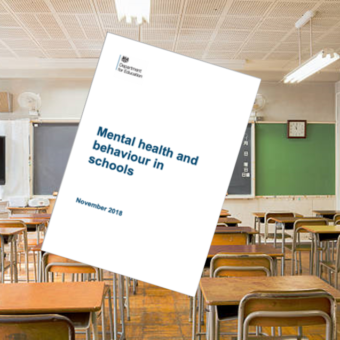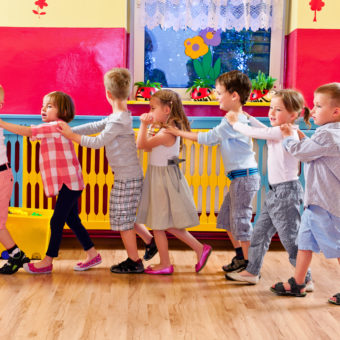Blog, Events and conferences, Positive Press Resources
“Mental Health and Behaviour in Schools” (DfE 2018) – What Does It Mean for Schools?
My name is Zara and I am the website manager, researcher and project manager in Jenny’s team. (Jenny usually also wants me to say that I have co-authored several books with her). Normally Jenny writes these blogs herself but occasionally if something is coming in which is important for all schools I will try and respond to it, having chatted to Jenny. We are very excited to see the relatively recent DfE paper (Mental Health and Behaviour in Schools); we have been promoting a whole school approach to mental health and wellbeing, linking with behaviour, in the dining hall, playground, classroom and staffroom for many years now.
It was great to see this long paper containing departmental advice from DfE. Released in November 2018, which delves into the  strong links between mental health and behaviour. The advice aims to help schools to support pupils whose mental health problems manifest themselves in behaviour. It states that “schools have an important role to play in supporting the mental health and wellbeing of children by developing whole school approaches tailored to their particular needs, as well as considering the needs of individual pupils.”
strong links between mental health and behaviour. The advice aims to help schools to support pupils whose mental health problems manifest themselves in behaviour. It states that “schools have an important role to play in supporting the mental health and wellbeing of children by developing whole school approaches tailored to their particular needs, as well as considering the needs of individual pupils.”
A particular strength of this paper is that it describes very well what is best for pupils according to research. In terms of how to achieve the best outcomes for pupils, I can see minimal guidance and that which is there is fairly general and left for the school to interpret. There are strong links also between Jenny’s Golden Model – Whole School Approach and wellbeing and behaviour too and it is interesting to see here how the model can support the ideas set forth in the paper.
Here are some interesting snippets from the guidance document:
“Schools have a central role to play in enabling their pupils to be resilient and to support good mental health and wellbeing. It is important that schools promote good mental wellbeing for all pupils.” Mental Health and Behaviour in Schools DfE November 2018

The Golden Model helps schools with a whole school approach to supporting the wellbeing of pupils and the staff who look after and teach them. Our Circle Time approach is a listening forum for children to help them express their feelings about school issues and to learn great communication skills. Jenny actively promotes fun and laughter – which are arguably as important to mental health and wellbeing as many more formal ideas.
“A school’s approach to mental health and behaviour should be part of a consistent whole school approach to mental health and wellbeing. This should involve providing a structured school environment with clear expectations of behaviour, well communicated social norms and routines, which are reinforced with highly consistent consequence systems. This should be paired with an individualised graduated response when the behavioural issues might be a result of educational, mental health, other needs or vulnerabilities.” Mental Health and Behaviour in Schools DfE November 2018
It has always been a particular strength of the Golden Model whole school approach that it is able to provide a seamless set of systems and strategies, that anyone can learn to use, that run throughout the classrooms, staffrooms, dining hall and playgrounds promoting strong moral values, positive behaviour, incentives and celebrations, consequences, respect and kindness.
“There are things that schools can do for all pupils, as well as those at risk of developing mental health problems, to intervene early to create a safe and calm educational environment and strengthen resilience before serious mental health problems occur.” Mental Health and Behaviour in Schools DfE November 2018
I look at ‘intervening early’ as having the systems in place to create the most safe and happy learning environment possible. One where pupils know their responsibilities, work to strong moral values and rules, and one where communication skills and social and emotional competencies are valued, worked towards and celebrated as a community.
“Prevention: creating a safe and calm environment where mental health problems are less likely, improving the mental health and wellbeing of the whole school population, and equipping pupils to be resilient so that they can manage the normal stress of life effectively. This will include teaching pupils about mental wellbeing through the curriculum and reinforcing this teaching through school activities and ethos;” Mental Health and Behaviour in Schools DfE November 2018
Jenny’s Golden Model helps to create a safe and calm environment where wellbeing can flourish. Through having the rules, respectful relationships and by building on children’s social and emotional competencies, kindness, safety, creativity and fun are key values which are promoted at all times.
Jenny very recently carried out some training recently for a lovely, committed group of PSHE leaders. They were all saying that tired teachers with too much paperwork were struggling to get through complex PSHE schemes. We mustn’t let this stand in the way of common sense and of making the learning environment a safe, emotionally heathy and constructive one.
So, good luck with interpreting the ideas within this document. We are always happy to discuss how Jenny’s particular training can help to create a great climate for relationships, respect and learning to flourish.
Website Managers Notes
- Here is the Guidance Document link: Mental Health and Behaviour in Schools DfE November 2018
See also my blog on “Can It Be That Ofsted’s Plans To Overhaul Inspections Mean That We Have Finally Reached The Tipping Point”
- Jenny Mosley is available for wellbeing, better behaviour and lunchtimes and playtimes INSET training days, Working In School Days and for different length projects involving several schools for schools training.
- Find out about booking Jenny or attending open training conferences around the country throughout the year. Jenny also excels as an educational presenter at schools conferences, LA conferences and Headteacher conferences.
- The areas of Jenny’s expertise include staff wellbeing training, training for mental health and wellbeing, training for positive behaviour for learning, early years training, training for midday supervisors and lunchtime supervisors, to promote calm dining halls and healthy, active playgroundsJenny’s resources support all her areas of training and are available form her webshop.
- Do get in touch if we can help! Phone 01225 767157 or email circletime@jennymosley.co.uk or use the contact formon our website.
